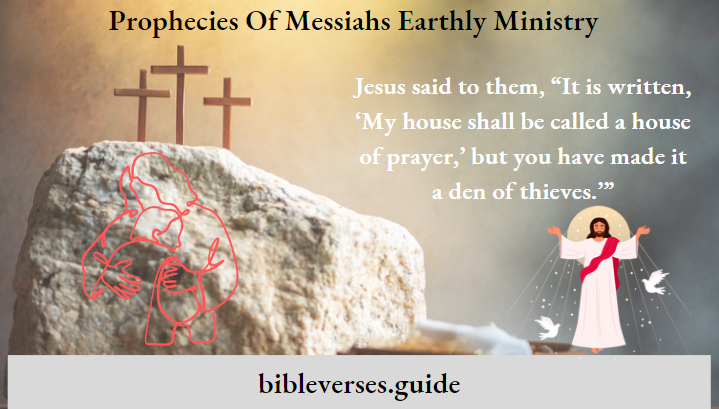Prophecies Of Messiahs Earthly Ministry
By the way of the sea, beyond the Jordan,
In Galilee of the Gentiles.
The people who walked in darkness
Have seen a great light;
Those who dwelt in the land of the shadow of death,
Upon them, a light has shined. (Isaiah 9:1-2)
Messiah entered this dark world to give it spiritual light. John the Baptist was sent by God as a forerunner, to testify of the Light; so that people might believe in Him. He was the fulfillment of God’s call to Abraham and Israel, to be a blessing to all nations.

Prophecies Of Messiahs Earthly Ministry Fulfillment
Jesus began His ministry in Galilee, traveling through the region preaching repentance, teaching in the synagogues, and healing the people of all their sicknesses. News spread about Him to all the surrounding regions and great crowds flocked to Him.
Read and Learn More Key Biblical Messianic Prophecies
From the Galilee region, Jesus began calling out fishermen to follow Him, promising to make them fishers of men.
Witness Nathanael
When Nathanael heard about Jesus of Nazareth, knowing from Scripture that Messiah would be born in Bethlehem, he asked if anything good could come out of Nazareth.
But after Jesus had spoken with him, Nathanael called Him Rabbi and declared He was God’s Son and the King of Israel.
” The Spirit of the Lord GOD is upon Me Because the LORD has anointed Me To preach good tidings to the poor; He has sent Me to heal the broken hearted, To proclaim liberty to the captives, And the opening ofthe prison to those who are bound; To proclaim the acceptable year ofthe LORD. . .” (Isaiah 61:1-2, emphasis added)
Witness Nathanael Fulfillment
On the Sabbath day, Jesus read this portion of Scripture from Isaiah to the synagogue congregation in Nazareth. He told the people assembled there that the Scripture was now fulfilled.
In applying these prophetic words to Himself, He was claiming to be the Messiah and proclaiming the nature of His mission.
At first, he was received well, but they also remembered that He was only Joseph and Mary’s son. Jesus would not prove His claim by performing miraculous signs for them and He said that no prophet was welcome in his hometown.
There had been many widows in Israel during three years of drought, but God did not send Elijah the prophet to any of them, He had only sent him to help a widow in Zarephath, in the region of Sidon.
There were many lepers in Israel in the time of Elisha the prophet, but only Naaman the Syrian was cleansed. After hearing this they were furious and dragged Jesus to a cliff edge, to throw Him over; but He calmly walked through the mob and went on His way.
Now Herod Antipas had divorced his wife, to marry his niece. John the Baptist had publicly condemned him for this sin and consequently, Herod had ordered his arrest.
While in prison, John sent two of his disciples to Jesus, to ask whether He was the coming One, or if should they continue waiting.
John’s surprising uncertainty was possibly caused by his expectations of a conquering Messiah, as most Jews were anticipating at that time. Perhaps he had even expected to be liberated from prison.
But Jesus was releasing captives of sin and performing miraculous healings. The blind could see; the lame could walk, and the deaf could hear! He also excelled in preaching and teaching the Gospel of Good News to the poor.
Witnesses John’s Disciples
Jesus told John’s disciples to report back to John with the evidence they had seen and heard of His ministry.
After their departure, Jesus praised John the Baptist, saying that he was a messenger from God and a great prophet. It was written about him in the Scriptures, the one who would come and prepare the way for Messiah’s coming (Malachi 3:1).
Messiah’s Entry Into Jerusalem As King
“Rejoice greatly, O daughter of Zion!
Shout, O daughter of Jerusalem!
Behold, your King is coming to you;
He is just and having salvation,
Lowly and riding on a donkey,
A colt, the foal of a donkey. “(Zechariah 9:9)
Messiah’s Entry Into Jerusalem As King Fulfilment
Jesus, knowing it would be His final journey, went up to Jerusalem with His disciples for the Passover feast. On this occasion presented Himself publicly as the Messiah and King of Israel.
Witnesses Disciples and Multitudes
As He rode towards Jerusalem on the foal of a donkey, the large crowds accompanying Him from Jericho cried out, “Hosanna to the Son of David! Blessed is He who comes in the name of the LORD!’ Hosanna in the highest!”{Matthew 21:9, Psalm 118:2; emphasis added)
As He drew near the city, knowing the future events that would happen to Jerusalem and her people, Jesus wept with great compassion.
He said that a time would come when their enemies would destroy the city and not one stone of the temple would remain intact. They would not see Him again until they said, “Blessed is He who comes in the name of the LORD!” (Matthew 23:39)
When Jesus’ procession entered Jerusalem, with the accompanying multitude loudly rejoicing and praising God, the whole city was shaken and wanted to know what was happening.
Jesus went straight to the temple and drove out those who were buying and selling there. In righteous anger, He overturned the tables of the money changers and the seats of those selling doves.
Witnesses The Lame The Blind And The Children
Then the blind and lame came to Jesus in the temple and He healed them. But the chief priests and scribes were angered by Jesus’ actions; and indignant when they heard the children shouting, “Hosanna to the Son of David!”.
Jesus said to them, “Yes. Have you never read, ‘Out of the mouth of babes and nursing infants You have perfected praise?”(Psalm 8:2 and Matthew 21:16)
The ordinary and disreputable people had listened to John’s message of repentance and were baptized. But the religious leaders had refused to listen to John or submit to being baptized by him.
These Jewish religious leaders also rejected and opposed Jesus. Throughout His ministry, they had looked for a way to outwit and trap Him.
Jesus had publicly accused them of pretending to be pious, but secretly seeking prestige and power. He had condemned them as being blind guides, who neglected justice, mercy, and truth.
After Jesus’ triumphal entry into Jerusalem as Messiah, they secretly plotted together to kill Him after the Passover feast.
Israel Rejects the Gospel Fulfilment
Jesus, knowing that He had a redemptive purpose to accomplish at His first coming, had openly declared His predicted sufferings and death. But He also said that He would be victorious over death and spoke of His future glory.
However, Jesus was misunderstood by the Jews when he said, “Destroy this temple, and in three days I will raise it up” ( John 2:19). They thought that He was speaking ofthe temple building, but Jesus was speaking of the temple of His body.
When pressed by the Jews for a sign, Jesus spoke of Jonah, who was a sign of death and resurrection. Just as the prophet had been three days and three nights in the whale’s belly; so He would be three days and three nights in the earth.
Jesus had also taught about the signs that would precede His second coming. But at that time, His disciples did not fully comprehend the things He told them. Knowing that the appointed time of His suffering was drawing near, Jesus was troubled.
He said that when He was lifted from the earth, He would draw all peoples to Himself, signifying how He would die.
The crowd, knowing the Scriptures that spoke of Messiah reigning triumphantly forever, questioned His statements. Even after all the miraculous signs and miracles they had witnessed, they did not believe in Him.
Yet some secretly believed, even among the leaders. But because of their fear of being put out of the synagogue, they kept quiet.
After His triumphal entry into Jerusalem and the confrontation in the temple, Jesus went to stay with friends in nearby Bethany.
While Jesus was eating, a woman came in with an alabaster jar of pure spikenard, and breaking the jar she poured all the contents on Jesus’ head. His disciples, especially Judas, criticized her for wasting perfume that was worth a year’s wages.
But Jesus defended the woman’s action; she had poured oil on His body to anoint Him for burial. What she had done would be remembered and admired.
